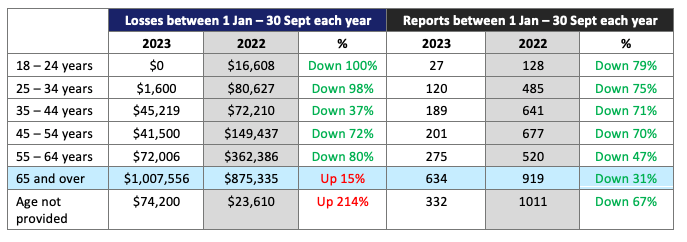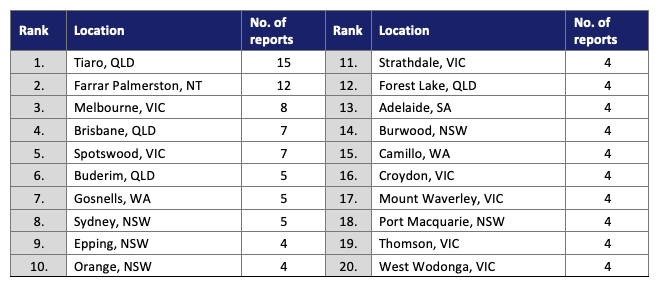$1.2m lost to nbn impersonation scams in 2023, Seniors and NSW residents most impacted
- Almost 1,800 Australians reported being targeted by nbn impersonation scams between 1 January and 30 September 2023, with losses totalling $1,242,081.
- Losses by Australians aged 65+ accounted for 81 per cent of losses ($1 million).
- Losses by New South Wales residents accounted for almost half of all losses nationwide ($601,482).
- nbn continues to help Australians stay scam ‘FIT’.
New data from the Australian Competition and Consumer Commission’s (ACCC) Scamwatch – released on the eve of Scams Awareness Week – reveals 1,778 Australians reported being targeted by nbn impersonation scams, with losses totalling $1,242,081 between 1 January and 30 September this year.
Australians aged 65 and over accounted for 81 per cent of these losses ($1,007,556), a sharp increase on the same period last year where this age group accounted for 55 per cent ($875,335) of total losses.
Across the states, NSW ($601,482 lost) and Queensland ($227,939 lost) were the most impacted, followed by Victoria ($172,171 lost).
Losses to nbn impersonation scams are primarily due to ‘remote access scams’, one of the largest growing online crime types in Australia. In this scenario, a scammer will call and offer to fix a problem on a person’s computer or device through remote access. If the victim follows instructions to download software such as AnyDesk to their computer, the scammer will gain access to banking credentials, and transfer money out of the victim’s account.
While total losses to nbn impersonation scams are reducing year on year, SMS scams are growing in prevalence with the ‘Hi Mum…’ and notices of overdue road toll accounts becoming much more widespread. nbn is urging the community to remain vigilant in identifying and protecting themselves against scams by applying nbn’s top three scam FIT tips:
- F – Focus on the details: nbn will never call to say you’ve been hacked, ask you to do a speed test or ask to remotely access your devices.
- I – Investigate: If you suspect a caller is not genuine, hang up and call their advertised number back – or phone a friend – a problem shared is a problem solved!
- T – Take action: Hang up on scammers and delete their texts and emails. Then, report it to the ACCC’s Scamwatch.
With Australians aged 65 and over most susceptible to nbn impersonation scams, nbn is extending its partnership with the University of the Third Age (U3A) to deliver in-person workshops where participants are taught how to recognise scam attempts and take steps to protect themselves.
Since November 2021, nbn has helped more than 60,000 Australians get scam ‘FIT’ through community events, online workshops and social media content.
Darren Kane, nbn Chief Security Officer, said:
“Every year, scammers are becoming more sophisticated in their approaches and strategies to extort money. They know how to sound convincing, create a sense of urgency and frequently change their scripts to leverage the latest products and news from companies like nbn to build credibility.
“The rule of thumb is, if someone claiming to be from nbn contacts you to ask for access to your devices or offers to improve your internet speed for you, hang up on them and report it to the ACCC’s Scamwatch.
“Only 13 per cent of victims report scam attempts to Scamwatch, which means the prevalence of nbn impersonation scams is far greater than what these figures reveal. By reporting all scam attempts, you’re helping create a clearer picture of what’s happening across the country, and enabling us to have the right measures in place to help keep Australians safe online.”
Glen Wall, President, University of the Third Age, said:
“While people over the age of 65 are often the most vulnerable to nbn impersonation scams, we know that given the right skills and training, there’s no reason older Australians can’t arm ourselves against scammers – and maybe teach younger Australians a thing or two about how to spot a scam.
“There’s no need to be scared of technology, once you know how to use it safely and protect yourself from harm, there is so much to be enjoyed from it.”
Scamwatch data
Financial losses and reports of nbn impersonation scams per state / territory, 1 January – 30 September 2023

Source: Scamwatch, ACCC
Financial losses and reports of nbn impersonation scams per age, 1 January – 30 September 2023

Source: Scamwatch, ACCC
Reported financial losses due to nbn impersonation scams between 1 January and 30 September 2023

Source: Scamwatch, ACCC
Suburbs with the highest number of reported nbn impersonation scam attempts

Source: Scamwatch, ACCC

